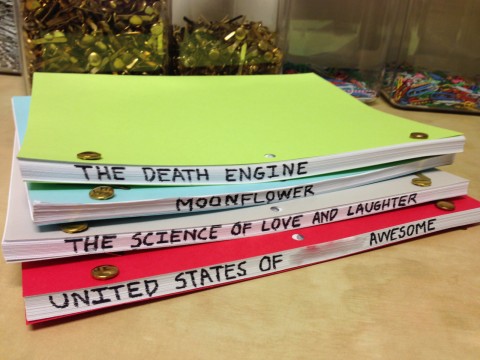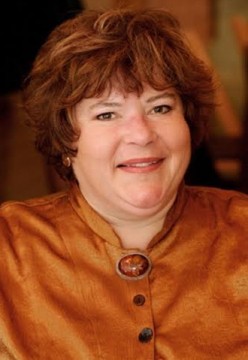
Sallie West’s screeplay, ‘Moonflower,’ sits alongside the other three recipients of the 2014 Nicholl Fellowships in Screenwriting. Credit: Courtesy of Joan Wai
Ohio State alumna Sallie West’s screenplay, “Moonflower,” is quickly gaining prominence after being awarded a Nicholl Fellowship in Screenwriting earlier this month, a title given annually by the Academy of Motion Picture Arts and Sciences.
West took a break from her longtime science writing career to do freelance work and explore writing fiction, which she had always wanted to do but had never gotten around to. She submitted “Moonflower” to the screenwriting competition in spite of believing her odds of winning a Nicholl Fellowship were slim to none.
“I knew the chances were impossible, but I just submitted it to see where in the world it might place,” West said. “And look what happened. It’s almost like a Cinderella story, seriously.”
AMPAS (better known for overseeing the Oscars) grants up to five Academy Nicholl Fellowships each year, the recipients of which are chosen through a rigorous judging process that entails six rounds of advancement, said Joan Wai, the Academy Nicholl Fellowships program manager.
Each fellow receives a $35,000 stipend from AMPAS, Wai said, on the condition that they develop a feature-length screenplay within a year.
This year, the Academy Nicholl Fellowships Committee ultimately decided the four winning scripts out of 7,511 submissions, a record high. Although there were more applications than ever, this is the first time in nearly 20 years that only four out of the five fellowships were given, Wai said.
“Moonflower,” described by Wai as a romantic drama, depicts how the lives of a cellist and a luthier (someone who makes or repairs lutes) intertwine. Much of the plot plays on the main characters’ careers, which are fueled by their ardor for classical music. West said that this common passion is a large part of what draws the two together.
“I wanted to write a story about a pair of people who were really well-suited to each other, but were separated by time,” she said. “And even though they are separated by a generation, they fall in love.”
AMPAS acquires no rights to the works of Nicholl Fellows, Wai said, and all scripts are read blind, without indication of the author’s name, city,

Sallie West was awarded the 2014 fellowship for her screenplay “Moonflower.”
Credit: Courtesy of Sallie West
state or gender.
West graduated from OSU in 1977 with an English degree, and went on to do several technical writing jobs at institutions such as Battelle, BAE Systems Inc., Duke University and most recently, the National Ocean Service. Her extensive writing background and knowledge of classical music contributed to the success of “Moonflower,” she said.
“When you work with words and language your whole life, writing becomes easy,” she said. “So for me, the difficult part wasn’t the writing; it was coming up with the creative ideas and plot.”
John Davidson, director of OSU’s Film Studies program, said although he doesn’t know West, her achievement is quite remarkable in the film industry world because she turned to it so late in her career.
“I’m sure many of the people who win this have been working at it for a while,” he said. “So I think it’s absolutely fabulous, and really a great tribute to her talents.”
OSU didn’t have a film studies major when West attended the university, but the interdisciplinary program has seen a steady increase in students since its start nine years ago, with about 215 enrolled currently. It even accommodates a screenwriting focus, Davidson said.
A third-generation OSU graduate and Columbus native, West said some of her first inspiration came during her time at OSU.
Marlene Longenecker, one of West’s former English professors at OSU, was the first person who told her she had a talent for writing. This short comment made by Longenecker — now retired — had a huge influence, West said, and helped her believe in herself as a writer.
“If you’re doing something creative, your mind gives you reasons as to why you shouldn’t be doing what you’re doing, and I’m here to tell you: don’t listen to that voice,” she said. “If it’s pleasant and you’re enjoying it, do it for that reason alone.”
West said she has a few ideas in the making for scripts she’d like to work on in the coming year, and she’s already gotten a head start on one of them.
The Academy Nicholl Fellowships in Screenwriting were founded as a local contest in 1985 by Gee Nicholl and Julian, widow of English-American screenwriter and producer Don Nicholl. The geographic scope of the competition has since turned international. To enter, the writer must use English and cannot have previously sold or optioned a screen or teleplay, Wai said.
Many Nicholl Fellows have gone on to craft acclaimed television series and Hollywood films, playing major roles in writing titles like “The Ring,” the “Transformers” trilogy, “The Vampire Diaries,” episodes of “Sex and the City,” “Erin Brockovich” and more. The youngest person to have received an Academy Nicholl Fellowship was 21, and the oldest 66, Wai said.
“Clearly there are a lot of people out there generating scripts, and the electronic application process had made it easier to turn them in,” Davidson said. “The competition is certainly broader, and it’s harder to float to the top.”
The winners will get official acknowledgement at the 2014 Academy Nicholl Fellowships Screenwriting Awards & Live Read at the Samuel Goldwyn Theater in Beverly Hills, Calif., on Nov. 13.
West currently resides in Charleston, S.C., but still thinks fondly of her time at OSU.
“I remember being 10 years old and going to OSU football games with my dad,” she said. “The games always remind me of my parents and my earliest memories, and they have a really special place in my heart for that reason.”


